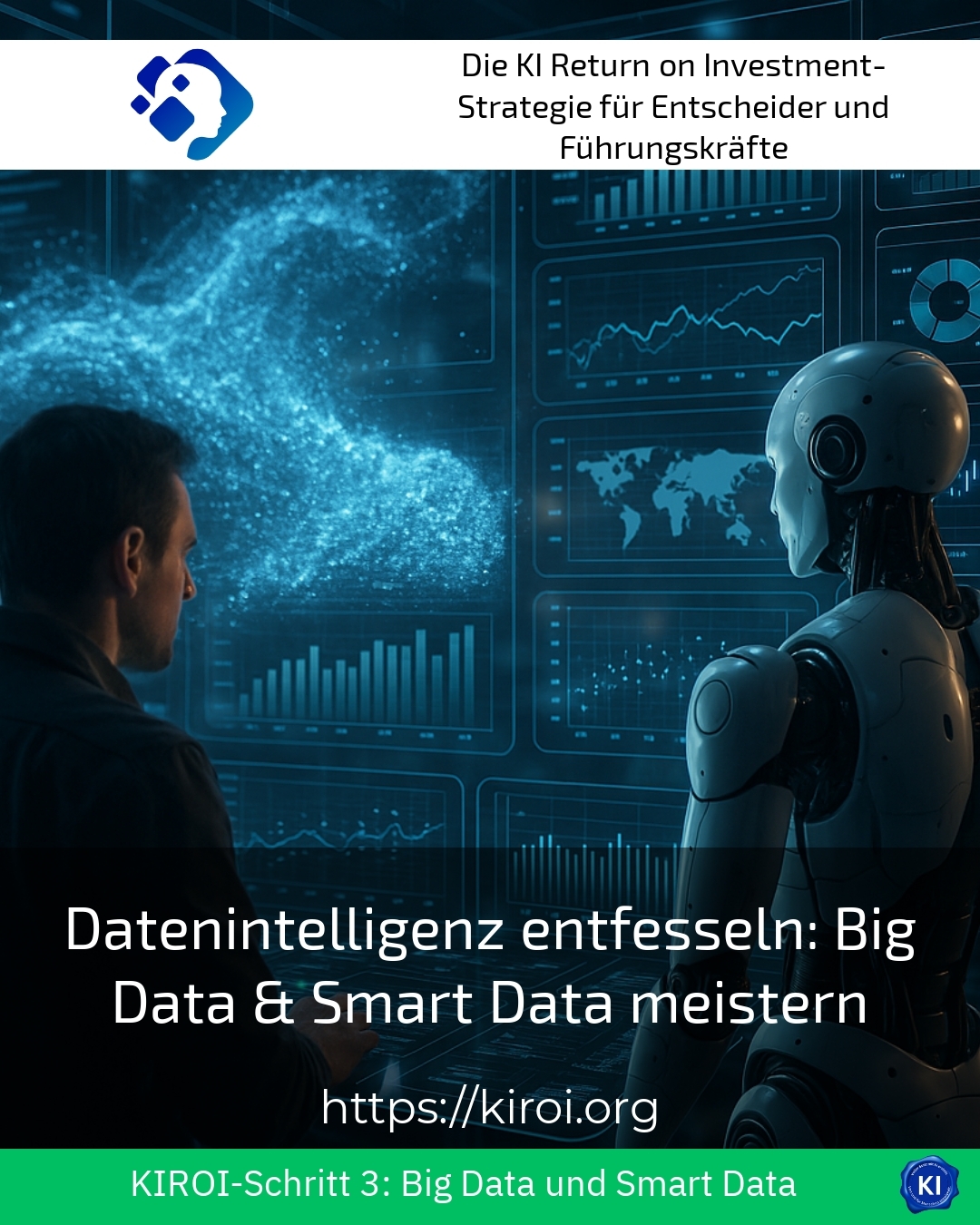At a time when data is being generated in ever greater quantities and at increasing speed, the ability to utilise this data intelligently is becoming increasingly important. Data intelligence supports companies in extracting valuable, usable information, i.e. smart data, from the mass of raw data known as big data. This allows decisions to be improved and processes to be organised more efficiently. In the following, you will learn how this process has proven itself in various industries and what impetus data intelligence can provide for projects and business models.
Data intelligence as the key to transforming big data
Big data encompasses huge, diverse and rapidly emerging volumes of data that companies generate on a daily basis. Examples include customer data in retail, sensor data in production and financial transaction data. However, this flood of data often contains a lot of irrelevant or incorrect information. This is where data intelligence comes in: it is used to filter and structure big data and convert it into smart data - i.e. into high-quality, contextualised and action-relevant information.
A practical example from the retail sector shows how data intelligence works: By analysing purchasing and search behaviour, personalised recommendations can be generated that appeal specifically to customers. In this way, an e-commerce company often significantly increases its conversion rates. In mechanical engineering, companies use sensor analyses to reduce downtimes and boost productivity with data-intelligent maintenance.
In the banking and financial sector, intelligent data analyses help to better assess risks and base investment strategies on reliable findings. This allows investments to be managed more precisely and wrong decisions to be minimised. The healthcare sector also benefits greatly: patient data from a wide range of sources is combined to make treatments more personalised and successful.
Why smart data makes the difference
While big data is primarily characterised by quantity, smart data focuses on quality. Smart data refers to data that has already been filtered, validated and processed so that companies can quickly gain actionable insights. Data intelligence ensures this transformation and thus supports better and more confident decisions.
For example, a logistics company uses data intelligence to predict precise delivery times from large amounts of tracking information. This reduces delays and improves warehousing. Marketing agencies use data-intelligent tools to continuously optimise campaigns and minimise wastage - leading to higher sales and better customer relationships.
In the industrial environment, smart data helps to analyse machine statuses in real time and plan maintenance with foresight. This reduces downtime and costs, which increases the competitive advantage. These examples illustrate how data intelligence and smart data are used in everyday life in a wide range of industries.
BEST PRACTICE with one customer (name hidden due to NDA contract)
A major German logistics service provider utilised data intelligence to extract relevant key figures from big data. This made it possible to forecast delivery times much more accurately and manage stock levels better. This reduced costs and improved customer satisfaction in the long term.
Data intelligence in project management and decision-making
Companies today often face complex challenges and rapid market changes. Data intelligence offers valuable support here by providing a better overview and targeted risk assessment. Managers use smart data to manage projects in an agile manner and seize targeted opportunities.
In the manufacturing sector, for example, data intelligence-supported analyses make it possible to continuously improve processes. Key production figures are monitored, trends recognised and adjustments made at an early stage. This increases both efficiency and quality. In marketing, smart data enables more precise targeting, which often results in greater campaign efficiency. Smart analyses of customer behaviour also open up new potential for personalised offers.
BEST PRACTICE with one customer (name hidden due to NDA contract)
A medium-sized marketing agency implemented a data-intelligent solution for real-time analysis of customer behaviour. This allowed marketing campaigns to be designed more flexibly and significantly reduced wastage. This led to a significant increase in sales and improved customer loyalty.
Action tips for the implementation of data intelligence
To successfully unleash data intelligence, companies should consider the following steps:
- Identify and structure data sources: Determine which data is relevant and how it should be recorded.
- Ensure quality: Check and cleanse data to ensure reliable results.
- Utilise technology: Rely on modern analysis tools, artificial intelligence and machine learning to process large amounts of data efficiently.
- Adapt processes: Integrate data-intelligent insights into existing workflows and decision-making processes.
- Train managers and employees: Promote a data-conscious mindset and qualify teams to analyse and interpret data.
These measures help companies move from big data to smart data and utilise data-intelligent potential for competitive advantages.
My analysis
Today, data intelligence is indispensable for maintaining an overview in a world of growing data volumes and creating targeted value. The transformation of big data into smart data enables companies to gain actionable insights and organise their processes more efficiently. Practical examples show that, whether in retail, industry, logistics or marketing, data-intelligent approaches can provide impetus and successfully support projects everywhere. A combination of technology, process integration and training is required to realise the full potential. Data intelligence thus accompanies the path to a digitally controlled future in the long term.
Further links from the text above:
[1] Data intelligence: from big data to smart data
[2] Big data vs. smart data: differences and benefits
[3] Big data explained simply
[4] Big data as an opportunity for companies
[5] Smart data: How intelligent data is shaping our future
[9] Big data and smart data: the combination for valuable insights
For more information and if you have any questions, please contact Contact us or read more blog posts on the topic Artificial intelligence here.















